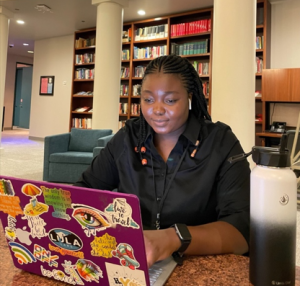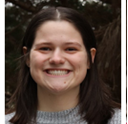Gainesville campus alum interns at The Carter Center
 May 2022 Political Science graduate Guyline Malala spent the summer following completion of her undergraduate career as an intern with an organization having a very special mission — The Carter Center (TCC) in Atlanta. During her time at TCC, Guyline worked primarily with its Democratic Republic of Congo Program (DRC). This was a natural fit, as Guyline grew up, until her mid-teens, in the DRC. Her parents decided to move to the US in order to get an excellent education for her and her siblings, which was not possible in the DRC.
May 2022 Political Science graduate Guyline Malala spent the summer following completion of her undergraduate career as an intern with an organization having a very special mission — The Carter Center (TCC) in Atlanta. During her time at TCC, Guyline worked primarily with its Democratic Republic of Congo Program (DRC). This was a natural fit, as Guyline grew up, until her mid-teens, in the DRC. Her parents decided to move to the US in order to get an excellent education for her and her siblings, which was not possible in the DRC.
The Carter Center is a 501(c)(3), not-for-profit, nongovernmental organization founded in 1982 in Atlanta, GA, by former U.S. President Jimmy Carter and his wife, Rosalynn, in partnership with Emory University. Guided by a fundamental commitment to human rights and the alleviation of human suffering, the Center seeks to prevent and resolve conflicts, enhance freedom and democracy, and improve health.
TCC currently conducts three programs in DRC, two of which are managed under the Human Rights Program (HRP). These are the Human Rights House (HRH) program based in Kinshasa and the Extractive Industries Governance (EIG) program in Lubumbashi. The third program, focused on Citizen Observation of electoral processes (CO), is managed under the Democracy Program. As an intern with the DRC staff, she worked cross-programmatically to support the needs of all three initiatives. She also spent time with the joined the India Project, which aims to research democratic backsliding in India and, through writing and strategic meetings with US policymakers, to make them more aware of these issues, hopefully influencing policy decisions at the highest levels.
According to Guyline, “the skills that helped me the most during my internship were my bilingual skills; my awareness of what is going on in the world; my ability to multi-task and prioritize activities; and [my affinity for] working with multiple team members.”
These skills were definitely appreciated by the Center. Her supervisors had this to say:
“Guyline’s unique perspective added great value to our discussions about the DRC during this time. She was eager to be integrated into the programs and learn about working in this field. Guyline was dedicated and engaged throughout her internship … [she] produced quality work products and participated in intern and programmatic meetings effectively.”
Reflecting back on the time just prior to her internship, Guyline says: “I learned about TCC from Dr. Bibek Chand. I told him about what I was interested in, and he told me about the Center; from there, I did research and found out about the internship, then I applied. During my internship, the material I learned in the South Asian Politics and Comparative Security Issues classes offered by PSIA on the Gainesville campus were a big help in my India project work.”
Asked why she chose to pursue a Political Science degree, Guyline says she took the long way –“I started with psychology, then biology, then sociology. I realized all of those are not my things. Then I tried political science, and I fell in love with it, and I realized I could help my own country of origin and other countries that are having the same hardship.”
Guyline offers the following advice to UNG students:
“All I can say is ‘Patience is a virtue’, because if I wasn’t patient enough I wouldn’t meet the right people to help me get where I am today. I had to meet a good advisor to advise me on what class to take. I had to meet the right classmates to create a better study group. I had to meet the right professors and other UNG staff to see the potential in me and advise me not to drop out because every year when things was not working my way I wanted to quit everything and just go find me job. Between my sophomore year and my senior year I had a lot of “NO’s” when applying for scholarship and internship but I didn’t give up — at the last minute two weeks before graduation I got one positive answer, that is changing my life right now.
Perseverance is everything no matter where you are from — many doors might be closed because you have a student visa or maybe you’re not American. This is a land of opportunity to learn to ask questions and you will find the answer you need. If you are not satisfied with the answer, find someone else and ask them. You are bound to find the right answer when you ask the right people.”
Editors note: Upon completion of her internship Guyline applied for a permanent position with TCC’s Human Rights Department. As of press time, she is still awaiting final word.


